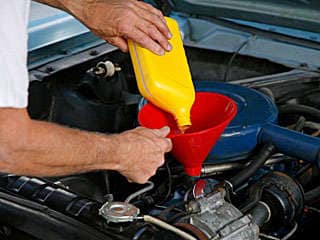Recent Articles
Popular Makes
Body Types
Getting Your Ride Ready for Summer Heat
Tips to keep your car cool, and your temperature from rising

Here in southern California, temperatures have already hit the century mark and the rest of the nation will be hitting their peak temps soon as well. But while beach party and poolside BBQ temperatures are great for upright-walking bi-peds in cargo shorts and Polynesian shirts, it kills cars. However, we can slow the process. Before you drop the top and don the sunglasses, run through this summer checklist to make sure you don’t spend the summer with the backs of your legs sticking to your mechanics pleather sofa.
You thought this was just going to be about overheating, but tires are far more important. Bad or improperly inflated tires not only reduce fuel economy, but can result in a blowout and loss of control. Look for cracks in the sidewalls due to too many days in the sun, or improper wear and get them replaced immediately if necessary. Underinflated tires heat up – a problem magnified by scorching pavement – making them prime candidates for premature failure. Air ‘em up!
Once you’ve taken care of your tires, look under the hood and check the condition of the rubber under there as well. There’s no sense in checking the coolant until you are sure no repairs need to be made. With the engine off and cool, look for cracks or oil on belts. If either condition exists, the belt should be replaced and in the case of oil, find out where it’s leaking from and get that fixed as well. Hoses should be somewhat rigid when squeezed at the midsection. If it can be compressed easily it’s time for a replacement.
Even if the hoses and belts look good and no repairs are needed, you may not be out of the woods yet. Undetected leaks can wreak havoc, slowly letting coolant escape in an invisible spray of steam. If you routinely have to add antifreeze to your car’s radiator but see no drips, you should have your system pressure tested which should help expose that annoying loss of fluid waiting to turn into catastrophic failure.
Page 2
No leaks, no worries—that is, as long as that coolant is still good. How do you know? You can purchase test strips that measure the pH level of your coolant and let you know whether or not it needs to be replaced. Flushing the system isn’t necessary unless the system has been badly neglected or you notice particles and/or sludge floating in it. Simply drain and refill with the correct mix to water as specified by the coolant manufacturer. Be sure to dispose of used coolant properly if you do it yourself.
Broken down oil can gum up passages and no longer protects moving parts from wear. Engine oil is the life’s blood of your car and it should be changed regularly to keep it performing its duties of lubricating and cooling your engine as recommended by the manufacturer of your car. If you don’t do this on the specified interval, than do it now before the mercury starts to rise. Unless of course, your summer plans include paying for your mechanics new boat.
Extreme heat is an assault on every last amp of life in a tiring battery. A multi-meter is usually used to test a battery suspected of being near its end, but many auto parts stores will perform the check for you if you think your battery is ready for the afterlife. Things to look for as a battery begins to expire: lights are dimmer than usual when the engine is off, and harder starting with a slower cranking sound. Keep in mind a bad alternator will not charge a battery properly and can lead to the same symptoms, but most auto parts store can test for that as well.
Moving from the engine bay to the passenger compartment, nothing will get your temper flaring worse than an air conditioning repair bill. If your A/C has lost its cooling power, odds are it’s do to low refrigerant, a.k.a. Freon. A/C systems are vehicle specific with specially formed hoses and condensers designed to fit within the unique dimensions of your model which can make them costly to repair. An A/C line can range from a couple hundred to over a thousand dollars. A/C plumbing is closed and pressurized which means 99.9 percent of the time, there is no place for Freon to escape to unless there is a leak. Get your system pressure checked before recharging it, or you will be paying to do it again after you complete the repairs needed in the first place.